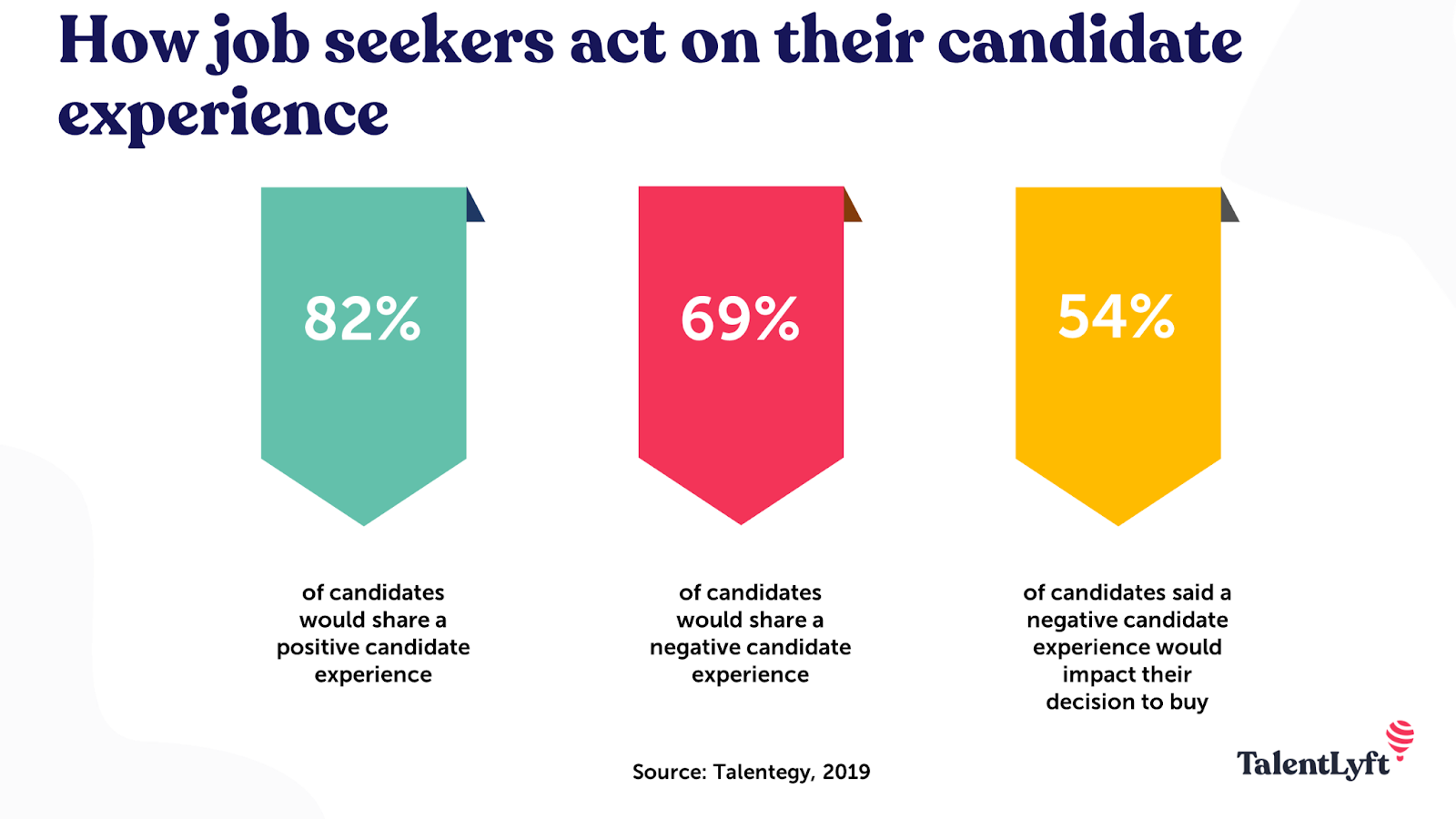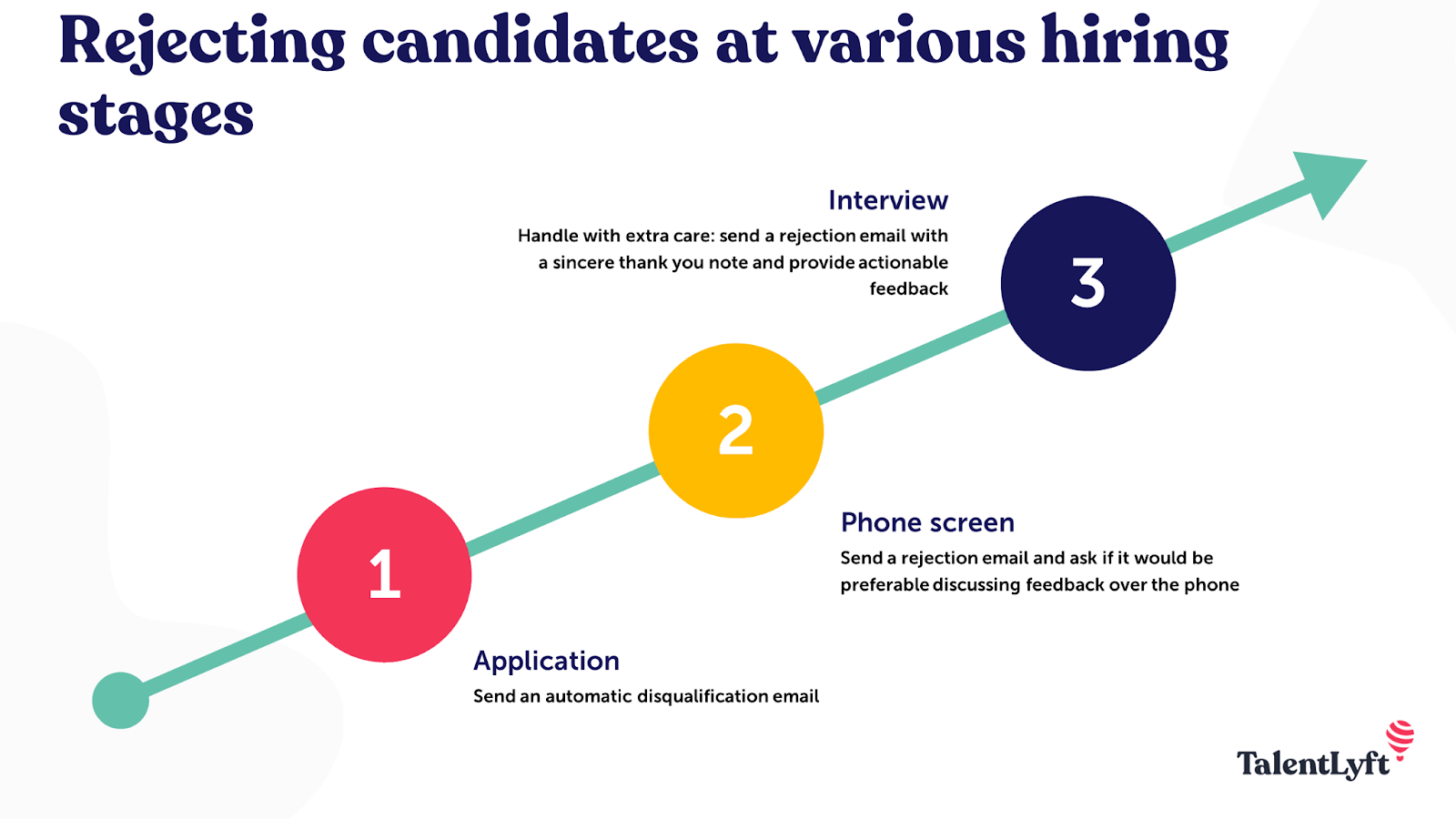![Boolean Search for Recruiters [Actionable Guide]](https://adoptoprod.blob.core.windows.net/article/7wyu_xAg806Tm_lmFg71Rw.png)
One of the most important ways to attract the best candidates to your company is candidate experience. But what about providing the best candidate experience when it comes to rejecting candidates?
One of the most important ways to attract the best candidates to your company is candidate experience. But what about providing the best candidate experience when it comes to rejecting candidates?
The number one cause of frustration among candidates is a lack of response from employers. Candidates put a lot of time and effort into their job applications and keeping them in the dark for a long period of time (or indefinitely) doesn’t reflect well on their overall opinion about you and your company.
Let’s say your candidates spend hours of their time researching your company, taking notes, and preparing for a meeting only for you not ever getting back to them. Can you blame them for feeling frustrated?
Think about it this way: out of all the candidates who apply for your open job position, only one of them gets the job. In other words, you’re rejecting a vast majority of the applied candidates. All those rejected candidates fall into one of two categories:
either they’re going to share their positive candidate experience, or
they’re going to tell everyone they had a negative experience with your company and your recruitment process

The candidate experience you provide plays a major role in the success of attracting the best candidates for your company. We all know words travel fast. People nowadays tend to share pretty much everything online and sharing their experiences with employers is no exception. Public reviews of bad candidate experiences could damage your reputation and ruin your efforts of employer branding. People who read those online reviews won’t consider working for your company and in many cases won’t consider buying or using your product. Never underestimate the power of bad online reviews. Not only will a bad candidate experience cost you your reputation, it can also cost you big bucks. Keep in mind that your rejected candidates are also your potential customers.
Even though positive candidate experience became a key recruitment factor used by companies, there’s still plenty of room for improvement in terms of figuring out how to achieve it.
Candidate rejection is an unavoidable part of every hiring process but being the bearer of bad news is never an easy task. It goes without saying that you can't hire every candidate who applies to your job opening but what you can do is show them you respect their invested time and effort.
First and foremost, don’t keep the candidates waiting for your response. Just imagine investing your time in preparation for a job application, only to never hear back from a company. It’s frustrating and it comes as no surprise that so many job seekers are feeling distressed and demotivated.
Second, acknowledge your candidates by explaining to them the reasons why they weren’t a good fit for a certain job position. Keep in mind that most of the rejected candidates will be grateful that you showed them respect and explained to them why they didn’t get the job.
There are different ways of communicating with your candidates based on where they are in the candidate journey.
Before we dig deeper into different ways of disqualifying your candidates, keep in mind that every candidate should get a confirmation email of their application. You can easily automate this email and it doesn’t take a lot of your time but shows the candidates that you are thankful they took the time to apply for your job opening.
Rejecting candidates at various stages requires different approaches. Here is how you can painlessly reject candidates in any stage of the hiring process:
Application
Phone screen
Interview

The reason for rejecting candidates immediately after their application is a lack of must-have requirements or skills. Some examples of missing those requirements are:
Not being eligible to work in the state or country
Not being fluent in the required language
Obvious lack of necessary skills required for that particular role
The most common reason for automatically disqualifying candidates is candidates not being eligible to work in the state or country. An astounding 86% of employers won’t even consider candidates who don’t have a visa or are not authorized to work in the country.
If a candidate is missing any of the must-have requirements listed in your job ad, you can only thank them for their time and send them an automatic disqualification email.
When sending out those emails, try not to send them that same day as many of the candidates expressed their concerns of not being sure whether an actual human being reviewed their applications.
On the other hand, if you want to avoid receiving countless unqualified applications, you can always mention an easy but precise explanation in your job ad that only qualified candidates will be contacted.
When disqualifying candidates at this stage, you can do so by email or phone. Consider first sending them a rejection email in which you can say you are available to speak with them over the phone if they have any questions. If they say they would prefer to speak with you over the phone, make sure to be prepared to answer any of the questions they might have. When you’re rejecting candidates at this stage, be sure to provide them with your feedback. Disqualifying candidates from the selection process with the appropriate disqualification reason makes for a little less painful rejection experience.
When disqualifying candidates after an interview, you need to take extra care. Your candidates already spent a significant amount of time preparing for every step of your hiring process and it would be extremely disrespectful not to give them the attention they deserve.
Send them a post-interview candidate rejection email containing a sincere thank you note and an explanation of why they didn’t meet the criteria.
Also, keep in mind that these currently rejected candidates might be a good fit for some other current or future job opening so nurture them accordingly.
If you were interviewing internal candidates and it turns out they didn’t possess the required set of skills for some reason, they should always be informed in person.
Research shows that a staggering 90% of recruiting emails aren’t personalized at all! Considering that today’s technology significantly reduces time and money spent on repetitive tasks in the hiring process, there’s really no excuse for leaving your candidates hanging or even worse - completely in the dark.
If you have an opportunity to create automated and standardized rejection emails without losing personal touch, why not make use of it? You can use some of the pre-existing templates to save some time or you can create your own custom email templates for every occasion.
By using email templates for each step reached in the hiring process, you don’t have to write every email from scratch. You can also send bulk emails and save yourself a significant amount of time but at the same time, you can customize those emails to send to different candidates. For example, if you want to stay engaged with a certain candidate whom you think might be a better fit for some future roles, you can create a separate email template telling them you would like to keep them in your database in case of a certain job opening.
All these actions don’t have to be overly time-consuming if you use the appropriate recruitment software to automate your hiring process and reduce the number of repetitive tasks.
According to a report by Talentegy, 63% of candidates say most employers do not communicate adequately. Let’s not forget a survey by CareerBuilder which brought to light that 75% of workers who applied for jobs didn’t hear back from employers. Poor communication, or in some cases, no communication whatsoever will leave candidates disgruntled. Disgruntled and frustrated candidates will most likely ditch their brand loyalty. Put yourself in their shoes - would you purchase products or services from a company that didn’t take a minimal amount of their effort to let you know you didn’t make the cut?
Avoid ghosting your candidates. Let candidates know where they stand, even if it’s a prompt rejection email. If you show your candidates that they can count on your feedback and your process is timely, fair, and respectful, those same candidates will probably want to stay in your database for some future employment and they are likely to refer others to come to work for you.
Boost your candidate experience by providing your candidates with consistent communication and constructive feedback.
Numerous researches and surveys over the years indicate that the majority of candidates are used to not hearing back from companies and it leads to general dissatisfaction amongst job seekers. It’s an alarming fact that candidates do expect not to get the actionable feedback they want and deserve.
Candidates are clearly craving consistent and transparent communication and why not stand out as the employer who made it possible? Even if you have to deliver bad news, make sure you do it in a timely and professional manner.
The most important thing is you stay consistent throughout the whole hiring process and stay in touch with your candidates out of respect and common courtesy.
Providing your candidates with an exceptional candidate experience is a must if you want to build and maintain an image of a desirable employer.
Why is it important to communicate timely with disqualified candidates?
Prompt communication respects the candidate's time and maintains a positive perception of the company.
How can providing reasons for disqualification benefit the candidate experience?
Offering constructive feedback helps candidates understand the decision and can aid their professional growth.
Why should rejection messages be personalized?
Personalized messages show respect for the candidate's effort, enhancing their experience and perception of the company.
How does the method of disqualification affect the company's reputation?
A respectful and thoughtful disqualification process can maintain or even enhance the company's reputation among potential future candidates.
What are some tips for sending disqualification messages at different hiring stages?
Tailoring the message to the stage of disqualification and ensuring it's constructive and empathetic can improve the candidate experience.










